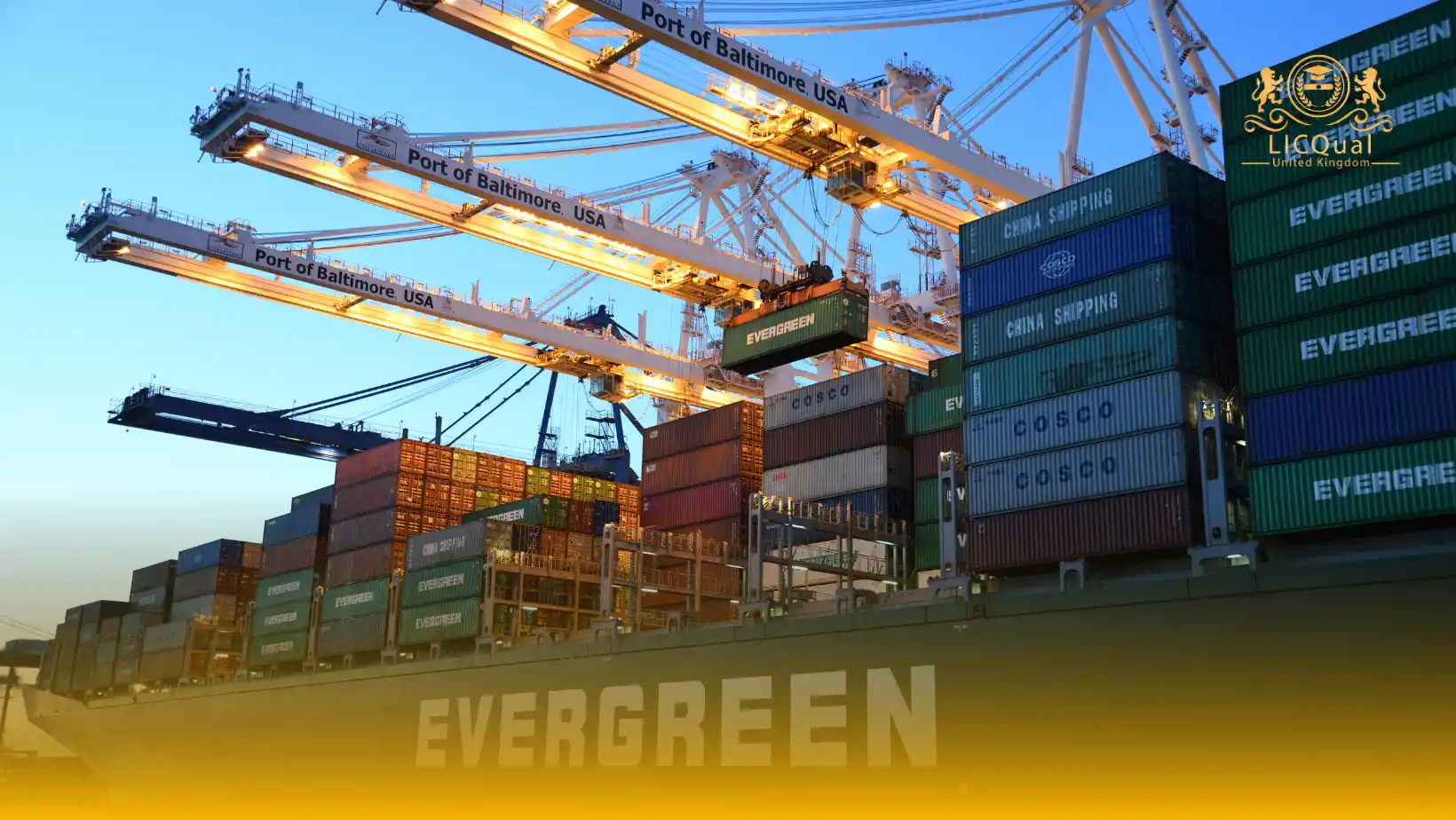The LICQual UK Level 3 Diploma in Ship Management and Logistics is a UK‑accredited qualification designed for learners who want to build a strong foundation in shipping operations, maritime logistics, and international trade. This program introduces the essential principles of ship management, port operations, and supply chain processes, making it an excellent starting point for those aiming to enter the global shipping and logistics industry.
Shipping and logistics are at the heart of international commerce, and professionals with expertise in ship management and maritime logistics are in high demand. The Level 3 Diploma in Ship Management and Logistics UK equips learners with practical knowledge of cargo handling, vessel operations, port management, and shipping documentation. By combining theoretical study with real‑world applications, the course ensures learners gain both academic understanding and industry‑ready skills.
This UK‑accredited Ship Management and Logistics Diploma Level 3 is internationally recognized, providing credibility for learners who want to pursue careers in shipping companies, freight forwarding firms, logistics providers, and port authorities.
The international diploma in Ship Management and Logistics (Level 3) emphasizes maritime safety, environmental awareness, and global trade practices. Learners will explore how ships are managed efficiently, how ports function as critical hubs in supply chains, and how logistics supports the smooth flow of goods worldwide. With a focus on employability, the program also develops professional skills such as communication, problem‑solving, and compliance with international standards.
Whether you are a school leaver, an aspiring shipping professional, or someone looking to transition into the maritime sector, the LICQual UK Level 3 Diploma in Ship Management and Logistics provides the knowledge, confidence, and recognition needed to start a successful career in global shipping and logistics.
Course Overview
Qualification Title
LICQual UK Level 3 Diploma in Ship Management and Logistics
Total Units
6
Total Credits
60
GLH
240
Qualification #
LICQ2201293
Qualification Specification
To enroll in the LICQual UK Level 3 Diploma in Ship Management and Logistics, applicants must meet the following criteria:
|
Qualification# |
Unit Title |
Credits |
GLH |
|---|---|---|---|
|
LICQ2201293-1 |
Introduction to Ship Management and Maritime Logistics |
10 |
40 |
|
LICQ2201293-2 |
Fundamentals of Shipping Operations and Cargo Handling |
10 |
40 |
|
LICQ2201293-3 |
Maritime Safety, Security, and Environmental Awareness |
10 |
40 |
|
LICQ2201293-4 |
Port Operations and Supply Chain Fundamentals |
10 |
40 |
|
LICQ2201293-5 |
Shipping Documentation and International Trade Practices |
10 |
40 |
|
LICQ2201293-6 |
Professional Skills for Maritime and Logistics Careers |
10 |
40 |
By the end of this course, learners will be able to:
1. Introduction to Ship Management and Maritime Logistics
Learners will be able to:
- Explain the fundamental principles of ship management and maritime logistics.
- Identify the key functions of ship managers, operators, and logistics providers.
- Demonstrate understanding of the role of shipping in global trade and supply chains.
- Apply basic concepts of vessel management to real‑world maritime scenarios.
- Recognize the importance of logistics in ensuring efficient cargo movement.
- Assess how ship management supports international commerce.
2. Fundamentals of Shipping Operations and Cargo Handling
Learners will be able to:
- Demonstrate knowledge of core shipping operations and cargo handling processes.
- Apply safe and efficient methods for loading, stowing, and discharging cargo.
- Recognize the importance of cargo care and damage prevention in shipping.
- Analyze the role of technology in modern cargo handling and vessel operations.
- Evaluate the impact of operational efficiency on shipping costs and performance.
- Apply international best practices to cargo handling procedures.
3. Maritime Safety, Security, and Environmental Awareness
Learners will be able to:
- Demonstrate understanding of international maritime safety and security standards.
- Apply knowledge of SOLAS, MARPOL, and ISPS Code to shipping operations.
- Recognize the importance of environmental protection in maritime logistics.
- Analyze the impact of pollution prevention measures on global shipping.
- Evaluate safety management systems for vessels and port operations.
- Promote a culture of safety, compliance, and sustainability in shipping.
4. Port Operations and Supply Chain Fundamentals
Learners will be able to:
- Explain the role of ports as critical hubs in global supply chains.
- Demonstrate understanding of port operations, cargo flows, and logistics networks.
- Apply knowledge of supply chain fundamentals to maritime trade.
- Analyze the interdependence of ports, shipping lines, and logistics providers.
- Evaluate the efficiency of port operations in supporting international trade.
- Recognize the importance of digitalization and innovation in port logistics.
5. Shipping Documentation and International Trade Practices
Learners will be able to:
- Demonstrate knowledge of key shipping documents, including bills of lading.
- Apply international trade practices to shipping and logistics operations.
- Recognize the legal and commercial importance of accurate documentation.
- Analyze the role of Incoterms in global trade and shipping contracts.
- Evaluate the impact of documentation errors on cargo movement and compliance.
- Apply best practices in preparing and managing shipping paperwork.
6. Professional Skills for Maritime and Logistics Careers
Learners will be able to:
- Demonstrate effective communication and teamwork in maritime contexts.
- Apply problem‑solving and critical thinking to shipping and logistics challenges.
- Recognize the importance of ethics and compliance in professional practice.
- Develop employability skills for entry‑level roles in ship management and logistics.
- Apply time management and organizational skills to maritime operations.
- Build confidence in applying theoretical knowledge to professional practice.
The LICQual UK Level 3 Diploma in Ship Management and Logistics is designed for learners who want to build a strong foundation in maritime operations, port logistics, and international trade. This UK‑accredited qualification is ideal for beginners, school leavers, and professionals seeking to enter the global shipping and logistics industry. It provides practical knowledge of ship management, cargo handling, and supply chain fundamentals, making it a perfect starting point for a career in maritime logistics.
1. School Leavers and College Graduates
- Students completing secondary education who want to pursue a career in shipping and logistics.
- Learners seeking a UK‑accredited qualification in ship management and maritime logistics.
- Individuals preparing for entry‑level roles in ports, shipping companies, or logistics firms.
- Graduates aiming to specialize in international trade and maritime operations.
- Young learners seeking a pathway to higher maritime qualifications.
2. Beginners in Maritime and Logistics Careers
- Individuals with no prior experience who want to understand ship management basics.
- Learners seeking structured knowledge of cargo handling and port operations.
- Candidates aiming to start careers in freight forwarding or logistics.
- People preparing for roles in international trade and supply chain management.
- Students who want a foundation for advanced maritime and logistics studies.
3. Entry‑Level Employees in Shipping and Logistics
- Staff working in freight forwarding, cargo handling, or port operations.
- Employees who want to formalize their knowledge with a recognized diploma.
- Individuals aiming to progress into supervisory or management roles.
- Workers seeking to strengthen their understanding of shipping documentation.
- Professionals who want to improve efficiency in logistics operations.
4. International Students and Global Learners
- Learners outside the UK seeking an internationally recognized qualification.
- Students aiming to build a career in global shipping and logistics.
- Candidates who want a UK‑accredited diploma for global credibility.
- Individuals preparing for roles in shipping firms and trade organizations.
- Learners who want flexible study options aligned with international standards.
5. Career Changers Entering Maritime Trade
- Professionals from other industries transitioning into shipping and logistics.
- Individuals seeking structured knowledge of ship management and logistics.
- Learners aiming to explore opportunities in international trade.
- Candidates who want to develop transferable skills in maritime operations.
- Those preparing for new career opportunities in global logistics.
6. Entrepreneurs and Small Business Owners
- Business owners involved in import/export and global trade.
- Entrepreneurs seeking to understand shipping law and logistics operations.
- Individuals aiming to reduce risks in international trade contracts.
- Business professionals who want to expand into maritime operations.
- Owners looking for practical knowledge of ship management and logistics.
Assessment and Verification
All units within this qualification are subject to internal assessment by the approved centre and external verification by LICQual. The qualification follows a criterion-referenced assessment approach, ensuring that learners meet all specified learning outcomes.
To achieve a ‘Pass’ in any unit, learners must provide valid, sufficient, and authentic evidence demonstrating their attainment of all learning outcomes and compliance with the prescribed assessment criteria. The Assessor is responsible for evaluating the evidence and determining whether the learner has successfully met the required standards.
Assessors must maintain a clear and comprehensive audit trail, documenting the basis for their assessment decisions to ensure transparency, consistency, and compliance with quality assurance requirements.







